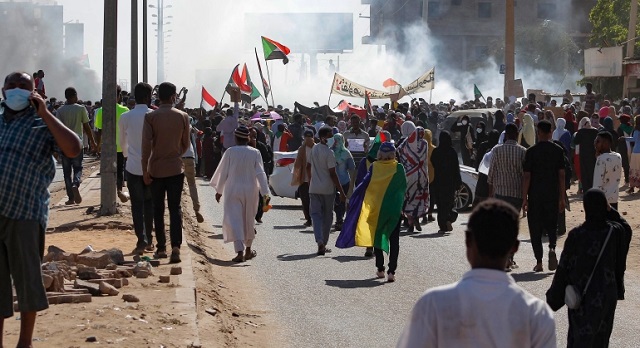
Khartoum, Sudan | Xinhua | The impact of the resignation of Sudanese Prime Minister Abdalla Hamdok will spill over from politics to the country’s already fragile economic situation, Sudanese economic analysts said on Tuesday.
In an obvious sign, after months of recovery and stability, the exchange rates of the Sudanese pound started to decline again against major foreign currencies, especially the U.S. dollar, two days after the resignation.
Dealers in the foreign exchange market said the exchange rate of one U.S. dollar registered 457 Sudanese pounds in the parallel market on Tuesday compared to 450 pounds during the past days. Also, the exchange rate of one Saudi Riyal registered 121 Sudanese pounds, while one UAE Dirham registered 122 pounds and one Euro 516 pounds, the dealers added.
On Tuesday, the Central Bank of Sudan set the exchange price of the U.S. dollar at 439,55 Sudanese pounds for the sale against 436,27 pounds for purchase.
Abdul-Khaliq Mahjoub, a Sudanese economic analyst, told Xinhua that “with the continued political crisis, the local currency is expected to continue declining in the coming period of time.”
“For over two months, there has been no executive government running the country, and it is natural for the economy and the national currency to decline,” he said.
The Sudanese authorities have not yet been able to approve the 2022 budget, and as a result of the scarcity of resources, the authorities are moving towards lifting subsidies from vital sectors, including gases and bread, and also decided to implement a new increase in electricity prices by more than 600 percent.
Recently, Sudan’s finance minister Jibril Ibrahim reportedly said, “We have abandoned our 2022 growth plans and are building a worst-case scenario via depending on limited resources.”
Sudanese economic analyst Ashraf Zain Al-Abidin, speaking to Xinhua, urged the authorities to search for resources that would not burden the citizens.
“The authorities should search for other resources and diversify the sources of revenue. It cannot be at the expense of the average citizens,” said Zain Al-Abidin.
“After Hamdok’s exit, we do not expect the major countries and international financial institutions to help Sudan,” he said, adding that the United States and international agencies suspended aid with hundreds of millions of dollars to Sudan, while Sudan’s debt relief process under the Heavily Indebted Poor Countries (HIPC) Initiative of the International Monetary Fund halted.
Sudan has been undergoing an economic crisis since the secession of South Sudan in 2011, due to which Sudan lost 75 percent of its oil revenues. In 2012, Sudan approved five packages to remove bread and fuel subsidies, which sparked a series of protests.
In December 2018, worsening economic conditions sparked popular protests across Sudan, leading to the ouster of former President Omar al-Bashir in April 2019.
The transitional government, which was formed in 2019 and headed by Hamdok, began implementing a structural reform, monitored by the International Monetary Fund, in a bid to get exemption from foreign debts.
On Jan. 2, Hamdok announced his resignation in the wake of a political crisis in the country.
Sudan has been suffering a political crisis after the general commander of the Sudanese Armed Forces Abdel Fattah Al-Burhan declared a state of emergency on Oct. 25, 2021 and dissolved the Sovereign Council and the government.
On Nov. 21, Al-Burhan and then removed Prime Minister Abdalla Hamdok signed a political declaration, which included reinstating the latter as prime minister, but the deal has failed to calm the streets.
*****
Xinhua
 The Independent Uganda: You get the Truth we Pay the Price
The Independent Uganda: You get the Truth we Pay the Price





